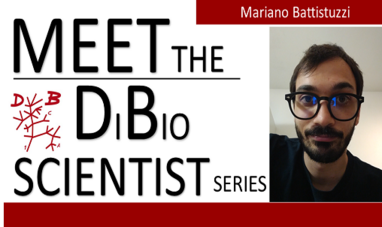
MEET THE DIBIO SCIENTIST SERIES : Mariano Battistuzzi
Scadenza: 02.11.2022 14:35
Pubblicato il: 11.08.2022 13:00
Mariano is a post-doctoral fellow at DiBio
Can you summarize in few words your research?
In a few words, I investigate the possibility of life beyond Earth. More precisely, I study terrestrial oxygenic photosynthetic organisms exposed to simulated environmental conditions of exoplanets orbiting the Habitable Zone of stars called M-dwarfs. The goal is to understand if these organisms could survive, acclimate and evolve oxygen when exposed to these challenging conditions. I also study if the oxygen released in the atmosphere could produce biosignatures, “signs of life” detectable from Earth through space telescopes.
What is the most rewarding and the most challenging part of your work?
Data collection is quite challenging. The number of measurements to be made is high and cultures need to be stored as quickly as possible when each experiment is finished. The most rewarding part of the work is knowing that my research can contribute to defining new limits for life as we know it, and most importantly, it can help to answer one of the most important questions for humankind: whether there is life beyond Earth or not!
Tell us your story: what brings you to DiBio?
I’ve been here for a long time. I graduated at Unipd and decided to do my PhD here as I had the opportunity to work on this interesting topic in a friendly and cooperative work environment.
What would you tell your younger self?
I would tell him to keep going on the road already taken: it will be full of satisfaction!
What’s your favourite “toy” for research – and what can it do?
I have two toys: the Light Star Simulator (SLS) and the Atmosphere Simulator Chamber (ASC). The first allows us to simulate, from 350 to 1000 nm, the emission spectra of different kinds of stars, among them the Sun and M-dwarfs. The second is a growth chamber which allows us to expose small photosynthetic organisms to the light of the SLS, under controlled conditions of pressure, temperature and atmospheric composition. The system allows us also to follow the oxygen evolution and the carbon dioxide consumption of the organisms through non-invasive sensors.
What are your interests outside science?
I like very much competing in table and online games, watching TV series and listening to music. Also, I like running and bouldering.





